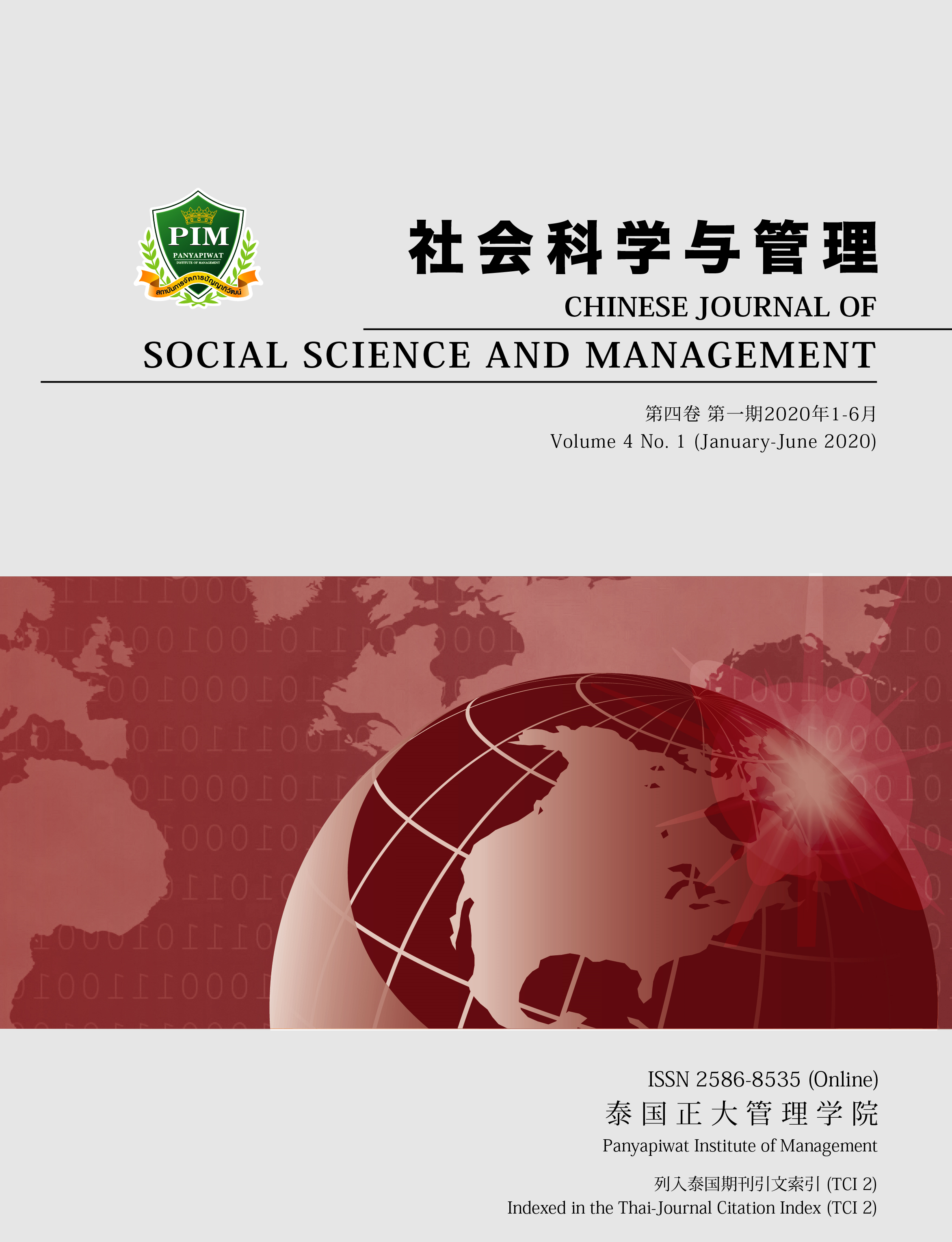COMPARISON OF THE MEANINGS AND TEACHING STRATEGIES OF CHINESE AND THAI WORD FOR “FOOT”
Main Article Content
Abstract
Abstract
In this paper, the representative word “foot” in Chinese and Thai languages is the research object, and with the help of comparative analysis, qualitative and quantitative methods and corpuses, the distribution of the word “foot” in Modern Chinese and Thai is described and analyzed. The dictionaries used as reference dictionaries were the Authoritative Modern Chinese Dictionary (7th ed.) and the Royal Thai Dictionary (2011). The word “foot” is one of the core words of the language involving the human body, ranking 46th in W. Swadesh’s 100-word List (2005). Zhengzhang (2005) add “*” as one of the most important words in the 300-Word List, ranking 98th, and indicate that this word is related to “leg” and “knee”. Many polyphonic meanings of “foot” in Chinese and Thai are associated with these words. The purpose of this paper is to discuss the teaching strategies based on a comparative analysis of the semantic item “foot” as a core word of Modern Chinese and Thai related to the human body, which may potentially play an auxiliary teaching role in the actual teaching of foreign languages.
Article Details
Chinese Journal of Social Science and Management Editorial Division
The Office of Research and Development, Panyapiwat Institute of Management
85/1 Moo 2, Chaengwattana Rd., Bang Talat, Pakkred, Nonthaburi 11120, Thailand
Tel. 02 855 01048 E-mail: cjssm@pim.ac.th
References
Center for Chinese Linguistics (abbreviated as CCL) of Peking University. (2003). Peking University CCL Corpus in 2019. Retrieved September 24, 2019, from http://ccl.pku.edu.cn:8080/ccl_corpus/
Feng, L. Y. (2003). Research on human body vocabulary in Chinese. Ph.D. Thesis, Wuhan University. [in Chinese]
Huang, B. R. (2009a). Semantic study of human words. Shanghai: Shanghai international studies university. [in Chinese]
Huang, B. Y. (2009b). Human Word Semantic Research. Doctoral Dissertation, Shanghai Chinese University. [in Chinese]
Huang, W. L. (2014). Comparative study on extended meaning of Thai Chinese human words. Master’s Thesis, Guangxi University. [in Chinese]
Ji, H. L. & Zhang, Y. H. (2007). On the metaphorical usage of “face” in Chinese. Journal of Yuxi Normal University, (5), 81-85. [in Chinese]
Lakoff, G. & Johnson, M. (1980). Metaphors We Live By. Chicago and London: University of Chicago Press. [in America]
Li, S. X. (2002). On the cultural connotation of human words. Journal of Inner Mongolia University (humanities and social sciences edition), (5), 58-63. [in Chinese]
Liu, Y. (2016). A study on the comparison and teaching strategies of representative word meanings of human body field in modern Chinese and Thai from the perspective of cross-cultural communication. Master’s Thesis, Guangxi University. [in Chinese]
Lu, W. Z. (2003). Cognitive characteristics of metaphor in human body. Foreign language teaching, 24(6), 23-28. [in Chinese]
Ma, B. L. (2011). A contrastive study of familiar emotional metaphors Thai-Chinese. Master's Thesis, East China Normal University. [in Chinese]
Meecharoen, U. (1999). The Study of Metaphorical meaning of Body Part Terms in Thai. Bangkok: Thammasat University. [in Thai]
Mei, H. (2014). Teaching Thai Chinese from the perspective of cross-cultural communication. Master’s thesis of Zhengzhou University. [in Chinese]
Modern Chinese dictionary (seventh edition). (2005). Commercial press. Dictionary editing office, institute of linguistics, Chinese Academy of Social Sciences. Office of
the Royal Society. (2011). Royal Institute Dictionary in 2019. Retrieved September 20, 2019, from http://www.royin.go.th/dictionary/ Office of the Royal Society. (2011).
Royal Institute Dictionary. Bangkok: Editorial Department of Royal Society of Thailand. [in Thai]
Phonlap, N. (2017). Comparative study on extension of human noun in Chinese and Thai. Master’s Thesis. Qingdao University. [in Chinese]
Qi, Z. H. & Wang, Y. N. (2007). The Cognitive Framework of the “Hearts” Words. Foreign Language Journal, (1). 61-66. [in Chinese]
Svetlana. (2015). A comparative study of human noun metaphor between Chinese and Russian. Doctoral thesis, Jilin University. [in Chinese]
Wang, D. (2011). Comparative study on metaphor of human body in Russian and Chinese. Master's thesis, Harbin normal university. [in Chinese]
Wang, F. (2013). A comparative study on the cognition of metaphor in Chinese-Russian stylistic words. Master’s thesis, Northeast Normal University. [in Chinese]
Wang, W. B. (2001). On the structure of spatial metaphor of Chinese “heart”. Journal of the People's Liberation Army Chinese College, (1), 57-60. [in Chinese]
Wang, X. F. (2018). Comparative study on metaphor of human body words in Chinese and Thai. Master's thesis, Tianjin University. [in Chinese]
Wang, Y. Z. (2017). A comparative study of the extended meanings of human body nouns between Han and Thai. Master's Thesis, Qingdao University. [in Chinese]
Wu, E. F. (2004). On the metaphorical cognitive system of Chinese “Heart”. Language teaching and research, (6), 49-55. [in Chinese]
Wu, G. M. (2000). Comparison of homologous words in Chinese and Thai languages. A case study of human body parts. Journal of PLA foreign languages institute, 5, 40-43+73. [in Chinese]
Wu, J. & Ma, J. J. (2012). Metaphorical Interpretation of “Faces” in Geometry. Journal of Mudanjiang University, (1), 128-130.
Xiang, E. L. (2007). The origin of the metaphorical meaning of “face”. Foreign language journal, (3), 28-31. [in Chinese]
Xiao, R. (2007). Comparative study of Chinese and Thai “Xin” words. Master's Thesis, Yunnan Normal University. [in Chinese]
Xu, H. J. (2010). A study of the metaphorical cognitive system of “face” in Chinese. Modern Chinese, (6), 65-67. [in Chinese]
Zhao, Q. (2007). Evolution of human noun's meaning and cognitive motivation in Chinese. Doctoral Dissertation, Beijing Language and Culture University. [in Chinese]
Zhao, X. D. (2010a). Cognitive research on semantic transfer of human words. Doctoral Dissertation, Fudan University. [in Chinese]
Zhengzhang, S. F. (2003). Old Chinese Phonology, Shanghai Educational Publishing House [in Chinese]
Zhou, B. J. (2006). Multi-angle research on human nouns in modern Chinese. Master’s thesis, Central China Normal University. [in Chinese]
Zhou, R. (2013). Cognitive analysis of metaphor of “human words” in Russian. Master's thesis, Jilin University. [in Chinese]
Zhu, P. (2012). Teaching research on core words of Chinese and English expressions from the perspective of cross cultural communication. Master’s thesis, Guangxi University. [in Chinese]


